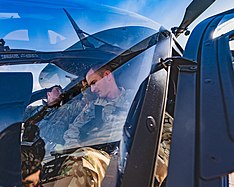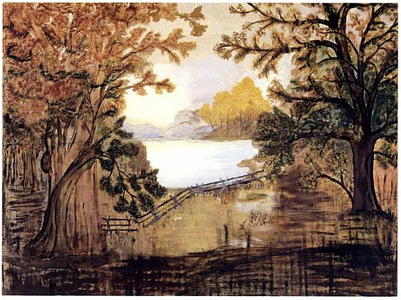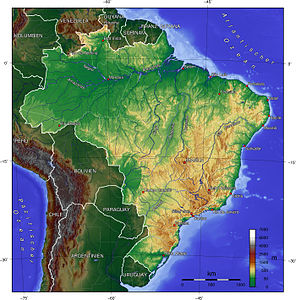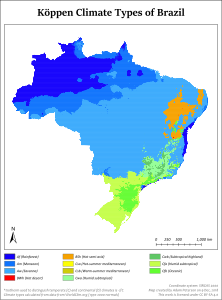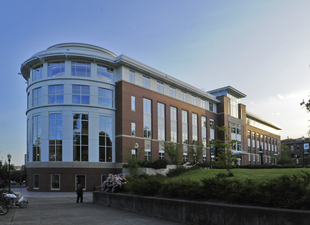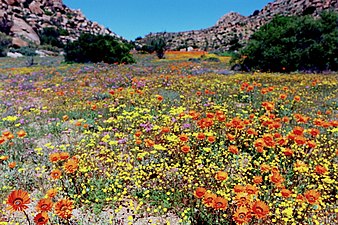Wikipedia:Wikipedia Signpost/Single/2019-09-30
Where do we go from here?
Wikipedia’s constitutional crisis may have come to an end.
The Wikimedia Foundation agreed that the English-language Arbitration Committee would have full power to review the one-year ban against administrator Fram. Three months later ArbCom unbanned Fram and removed his admin status while allowing him to apply for its reinstatement. The RfA failed and Fram withdrew. The details of the Fram case are covered in this month’s Special report. This article explores how we can address the underlying issues of the case moving forward.
At first glance, Wikipedia’s multilevel decision making process has shown that the en:Wiki community can protect its independence from the WMF, can make nuanced decisions about admin incivility and harassment, and protect editors against harassment once they file a complaint.
But on closer inspection, none of that was accomplished. The process was agonizingly slow, confused, and just ugly. The community did not come up with a method to minimize harassment in everyday practice. The difficulty of giving accused harassers enough information to defend themselves while protecting their accusers against potential further harassment was underlined. And any cooperation between the WMF and ArbCom or the community to prevent harassment was trashed as the WMF was routinely derided as the cause of the whole affair.
We believe that three issues must be addressed simultaneously before the constitutional crisis is resolved:
- How to protect editors against harassment? If we can’t protect our editors, we’ll lose our best and brightest. Wikipedia may become the playground of trolls.
- Can we find a reasonable method for accused harassers to defend themselves while still preserving the accuser’s ability to file a complaint without further harassment? and
- Can we cooperate using all the tools of the community, ArbCom, and the WMF to prevent harassment before it happens and deal effectively with it after a complaint is made? If we treat the WMF as the enemy, we’ll be losing many of the tools that can minimize harassment.
— The Signpost
A proposal that ignores one of the issues will ultimately fail on all three counts.
Voices from the community
ArbCom will soon start a request for comment on these and similar issues. The Signpost asked over a dozen well-respected editors how we can move forward rather than dwelling on the wounds of the recent past. Perhaps because the wounds are still fresh only 6 agreed to comment using their usernames. Another allowed their comments to be used without their username. All responses were edited for length.
Our movement has more or less relied on an unwritten division of power between the Foundation, the affiliates, and the communities. Our communities are generally self governing, except in a few clearly defined cases... Individual communities of course can and should be held to account if they are not meeting movement norms by the movement as a whole.
As our movement grows and brings in new people we need to move from an unwritten to a written division of power (ie a movement charter or constitution). Thankfully this has been proposed in our 2030 strategy process.[1]
With respect to the decisions of ArbCom, when the case was handed over I made it clear at the time that I will stand 100% behind whatever decision ArbCom makes and that is still my position.
— Doc James (in his volunteer capacity, not in his position as a WMF trustee)
Levivich wrote, "The project will not succeed if we ignore or outsource maintenance of the pillars. Each of us can see harassment when it happens on-wiki; each of us has an obligation to not tolerate it. If bystanders spoke up more often, victims wouldn’t need to report."
Levivich's proposal appears to be very difficult to implement. He is suggesting a complete change in Wikipedia’s culture. Perhaps this is the only way forward.
Wikipedia needs to improve the sometimes hostile and toxic environment for article creators and editors, both new and old. People who edit WP need to understand that encouragement of good faith new editors is equally as important as quality control …. There are guidelines and policies on WP that need to be respected, but these requirements can be handled with grace and cooperation, not the kneejerk
I Don't Like Itreactions too often seen.
—MontanaBW
One editor who preferred that his username not be used was skeptical that progress could be made "because one person's harassment is another's defending the encyclopedia." It would be easy to swamp ArbCom, “but if it were possible to filter out … misguided claims of harassment, a complainant might email ArbCom. The remedy might be to separate the people involved along the lines of ‘if the edits need attention, let someone else deal with it’…. There might be volunteer mentors who would act as intermediaries.”
I don't expect easy answers to the harassment and fair process conversations…. our open forms of dispute resolution seem particularly unsuited to addressing long-term poor behaviour that is countered with positive contributions...
Ultimately this is something that the community needs to decide on, and the Foundation needs to respect and support -- not take over.
While I am not happy with how the community interacts with Foundation staff (insults, personal attacks, and the like), this is ultimately a problem of the Foundation's own creation.
Guy felt the WMF was to blame. His suggestions included:
- WMF needs to write a policy for interventions on projects that details the amount of autonomy those projects have and offers office escalation as an option where a project has no ArbCom equivalent...
- WMF needs to enact and document an internal review process, such that we can be confident that a ban is not enacted without fully independent review.
- WMF needs to set up an appeals process for bans, and allow third party appeals from functionaries / ArbComs of projects...
The mechanics for (reporting harassment) do exist, in that people could and should inform the arbitration committee or functionaries mailing list confidentially if they are concerned about their safety. However in practice, I do recall situations where the committee has been slow to respond or act.
Regarding providing a adequate means of defense for the accused, the general principle in the workplace is that the origin of a complaint must be known to a person as a default to allow dispute resolution or management to take place. This should be the case on WP unless a complainant can make a case to the committee that there is a compelling reason otherwise.
— Casliber
What's next
There are some areas of agreement in all these views. Everybody recognizes that there's a problem with harassment or with the WMF's approach to it. Some respondents believe that we have a system in place to deal with harassment, but perhaps it can be improved. Others think that for Wikipedia's approach to harassment to change, our editors' attitudes must change. Nobody praised the WMF's approach to the problem. The RfC to be run by ArbCom will be interesting.
As always, your opinion, politely expressed in the Comments section below, is appreciated.
Post-Framgate wrap-up
The Arbitration Committee case examining the conduct of English Wikipedia administrator Fram concluded, with the Committee vacating Fram's ban by the Wikimedia Foundation, and assuming responsibility for the removal of Fram's administrator privileges. The intent to open a Request for Comments discussion on "how harassment and private complaints should be handled in the future" was also announced. Subsequently, Fram filed a request for administrator privileges. A day later, after more than 200 editors expressed opinions with over half against Fram's reinstatement as an administrator, Fram withdrew the request.
Background
Arbcom decision
On September 21, the Arbitration Committee (Arbcom) case stemming from the incident was closed. Findings reaffirmed usual policy considerations including civil behavior and administrator behavior, but hinted at supra-community responsibilities with a "Proportionality of sanctions" section and stated "Private evidence" requires a commensurate private hearing. Remedies applied were un-banning Fram, requiring a new RfA, and announcement of a future "Arbcom RfC regarding on-wiki harassment".
Re-RfA
On September 26, Fram moved a request for adminship out of user draft space. The application was co-nominated by five individuals (Chowbok, Fastily, Iridescent, Lourdes, Xeno) – all but one of whom are either administrators or bureaucrats.
In this RfA, as with pretty much every one before, especially persuasive arguments were echoed by other contributors with the comment "per so-and-so". Supporters cited "per Iridescent" more than any other participant's argument. His co-nomination provided praise for Fram and said "atrocious" behaviors that attracted censure in the past "have been virtually non-existent" since 2018 warnings. Editors opposed to returning administrative tools cited Drmies's oppose rationale, in which he highlighted actions that have been suppressed but are alleged to be labeled "Potentially libelous/defamatory", more than any other. Other editors additionally cited more mundane temperament and civility issues.
On September 27, a little more than 24 hours after it began, with the vote standing at 109 in support and 122 opposed, Fram withdrew the application, stating:[a]
There clearly is widespread concern about my behaviour and attitude (though also a heartwarming bunch of supports). I will continue to edit, take the applicable concerns to heart, and hope to reapply in a year (or later) with a better track record.
Footnote
- ^ Some portions of the RfA history have been suppressed
A net loss: Wikipedia attacked, closing off Russia? welcoming back Turkey?
Net loss?
Wikipedia down: 'Malicious attack' brings down online encyclopedia after pages fail to load according to The Independent on Saturday, September 7. The attack was a
Toker also pointed out that "organizations like the Wikimedia Foundation seek to maintain a direct relationship with users in the interest of privacy, which means they can't readily opt for commercial DDoS protection services. Developing defenses against large-scale attacks while running a free and open service is an unsolved technical problem." He was apparently referring to the fact that Wikimedia's privacy principles generally preclude the sharing of private reader data such as IP addresses with third parties, whereas e.g. Cloudflare's standard DDoS protection service involves redirecting traffic to the company's proxy servers. However, on the day after the attack began, WMF Executive Director Katherine Maher stated that Cloudflare was indeed coming to the rescue: "they’ve been absolutely top notch, helping us roll onto a new service offering of theirs that was barely yet in the wild, direct lines of collaboration between staff on both sides" - apparently a reference to the "Magic Transit" service Cloudflare had announced in mid-August, with presumably somewhat differing privacy implications. In any case, the apparent attacker had already announced they would stop targeting Wikipedia (at least for some time) and take down certain video gaming services instead, with
Perhaps something good came out of the attack: Wikipedia Gets $2.5m Donation to Boost Cybersecurity from Craig Newmark, the founder of Craigslist, according to InfoSecurity. Other coverage followed that of the WMF News.
Turkey's ban of Wikipedia to be overturned? Citing a pro-government journalist, Ahval News on September 11 was the first of several outlets to predict: "Turkey’s top court set to rescind Wikipedia ban". But there's no actual news yet.
Russia's internet to be sealed off and the Great Russian Encyclopedia is still the future of the Russian internet according to
Net gain?
Grant Ingersoll has been hired as the Chief Technical Officer of the WMF (WMF News). His background with Apache Solr (now part of Lucene), and especially Apache Mahout led him to be interviewed by Java technology zone technical podcast series back in 2011. During the discussion, Ingersoll speaks primarily about scalable machine learning. More recently, Ingersoll has been the CTO of Lucidworks. Ingersoll is a recognized expert on automated data retrieval.
Politics
You've been published in a fake academic journal
BuzzFeed News reports that This Website Will Turn Wikipedia Articles Into "Real" Academic Papers. If only it were that easy. The so-called academic papers are missing a few things, like a listing of the authors' names, abstracts, publishing dates, footnotes, graphs, tables, and other illustrations. But if your professor has never read an academic paper, you may be in luck citing the "academic paper".
The best way to view the output is to go to the site https://m-journal.org/ and enter the name of your favorite Wikipedia entry. The site then generates the "article" and can also generate a citation. If you resubmit the same Wikipedia entry, you get a nearly identical article, but with a different title, authors and publication dates. See the two citations for Seth Kinman below.
- McGrath, Tony. "The Complete History of Exploding whale." JournalOfm.org, M-Journal, 31 July 2010, https://journalofm.org/article/the-complete-history-of-exploding-whale.pdf.
- Richards, Margaret. "The Complete History of Seth Kinman." JournalOfm.org, M-Journal, 5 August 2003, https://journalofm.org/article/the-complete-history-of-seth-kinman.pdf.
- Richards, Stephen. "How Mad Gasser of Mattoon Altered U.S. History." JournalOfm.org, M-Journal, 12 April 2017, https://journalofm.org/article/how-mad-gasser-of-mattoon-altered-u.s.-history.pdf.
- Smith, Darien. "How Seth Kinman Altered U.S. History." JournalOfm.org, M-Journal, 2 August 2014, https://journalofm.org/article/how-seth-kinman-altered-u.s.-history.pdf.
Those who get upset at violations of the CC-By license will have enough material to be angry for at least a year. But don't take this seriously folks. Please don't take this seriously.
Odd bits
- Automated translation of English to Hindi Wikipedia: The Hindu reports that the Indian Ministry of Science and Technology is using automated processes including artificial intelligence to translate articles into the Hindi language Wikipedia. Scientists will also help translate and create new articles in Hindi and other Indian languages costing up to $US1.4 million over three years.
- Ask Alexa (and an Anonymous Crowd Answers?): Denyse O'Leary on Mind Matters questions the use of crowdsourcing as it's being tested by Amazon to answer questions posed to Alexa. Her argument is that "Wikipedia is a classic example of how crowdsourcing can go wrong", so why would it work for Alexa? She gives five reasons why it doesn't work on Wikipedia:
- hidden points of view can be inserted
- doubtful claims can appear to be well-accepted
- crowds can shout down experts on obscure topics
- sourced, but untrue, information can be accepted as factual
- the end result can be "appallingly biased" — where she's quoting Larry Sanger
- The ultimate source of these problems, according to O'Leary is the anonymity and lack of accountability of the authors. Mind Matters and O'Leary are associated with the Discovery Institute which is known for its strong support of intelligent design over Darwinian evolution. The Discovery Institute has previously taken issue with how Wikipedia handles intelligent design content.
- Which witch, when and where? Try Wikidata: Emma Carroll, a new Wikipedian, landed a challenging internship "to use the data recorded within" the Survey of Scottish Witchcraft Database and "find visually interesting ways to document the data for public viewing through the form of digital maps and Wikidata." From this June through September she tracked down the residences of many of the over 3000 accused Scots witches from the period 1563 – 1736, then displayed these and other locations on digital maps and uploaded the data to Wikidata. The Scotsman covers the details of the project with the help of Ewan McAndrew, Wikimedian in Residence at the University of Edinburgh. About 20 accused Scots witches now have Wikipedia articles.
- mass hysteria. Or was it industrial pollution? Spilled nail polish? A real "mad anaesthetist"? Or was it just a normal case of the paranormal?
- New high possible for WIKI on the stock exchange: The shares of Seattle-based marijuana advertiser Wikileaf Technologies, which makes no claims to be related to Wikipedia, began trading at C$0.40 per share on the Canadian Securities Exchange (CSE) using the ticker symbol WIKI. The unusual listing is reverse takeover of an already trading company which avoids the regulatory scrutiny of an IPO. The CSE is Canada's youngest stock exchange and has a budding business trading the shares of over 100 marijuana companies. Marijuana company shares have been smoking hot this year, but are widely consideredto be speculative investments.
- The Twenty-Six Words That Created the Internet: The book of that title by Jeff Kosseff is reviewed in The Wall Street Journal. The 26 words are
- No provider or user of an interactive computer service shall be treated as the publisher or speaker of any information provided by another information content provider,
- in Section 230 of the Communications Decency Act. Every Wikipedian could benefit from knowing the issues surrounding these words and how this law might change.
- Defending Wikipedia's honor: Vice has Asked a Wikipedia Contributor Why Everyone Thinks They're Unreliable? The administrator on the Indonesian Wikipedia, whose user name is not given, does a very good job defending our honor.
- New West cops blocked in attempt to scrub off-duty assault from Wikipedia: The Police Department of New Westminster, British Columbia, Canada was caught removing the history of an alleged bad cop from "their" Wikipedia article. In 2009 the cop allegedly participated in a robbery and assault. He got a conditional discharge in court, with a year of probation and no permanent criminal record, but lost his job as a policeman. The New Westminster Police Department was almost as lucky, getting a permanent soft block for a promotional username NWPD media. So who policed the police department?
- Cannibalism: a minor media outlet continues the custom of sensationalizing Larry Sanger's activities. It's a wild ride through Larry's tweets, but in the end Larry comes down "firmly against cannibalism."
- Read a random article on your Apple Watch: MiniWiki unofficial Wikipedia Apple Watch app adds ‘Random’ articles, independent language. If the illustration in the article is a good guide, you can read up to 21 words on the watch.
Varied and intriguing entries, less Luck, and some retreads
- The commentary in this article is meant to be humorous. The opinions expressed by the authors are their own and do not necessarily represent those of The Signpost —S
- This traffic report is adapted from the FoxyGrampa75 (September 8 to 14), and Hugsyrup(September 15 to 21).
Out of Luck (August 24 to 31)
Following the depressing dominance of Mindhunter last week, I am greatly appreciative to be able to report that this week's iteration is slightly less monotonous, a fact brought about by the diminished number of views required to sneak into the Top 25 over the past seven days. As such, in addition to all of the expected malevolent and malicious murderers who lingered in the report, we have a list featuring a surprisingly diverse report with a series of disparate sporting entries, two films at the forefront of the impending awards season, and a number of musically inclined entries, alongside the usual cohort of the recently deceased who appear on each week's report, and the list containing all notable entrants through the
Thus, for the week of August 25 to 31, 2019, the 25 most popular articles on Wikipedia, as determined from the WP:5000 report were:
Rank Article Class Views Image About 1 Andrew Luck 
1,203,492  Parks and Rec cameo.
Parks and Rec cameo.2 Saaho 
1,005,682 
It wouldn't be a week on the Top 25 Report without an appearance by the latest and greatest Bollywood blockbuster. Buoyed by that YouTube money, this week's behemoth is amongst the most expensive films made in the industry, and stars a man used to such massive budgets. Critically, it has been received rather poorly, but it has recouped its production budget at the box office, so is half-way towards its break-even point. 3 Jessi Combs 
937,423 
Discovery Channel viewers were shocked and saddened by the passing of former Mythbuster Jessi Combs, who died in a car crash while attempting to set a new speed record. The outpouring of grief and morbid surprise at the 39 year old's passing regretfully propelled her to this lofty position on the report. 4 Group of Seven
(G)796,654 In the picturesque French city of Biarritz, the world's foremost economic powers (who don't use unrestin Hong Kong.5 Mindhunter (TV series) 
794,777 
Following its complete dominance of the report last week, I have taken a conscious decision this week, both in aid of evading the perils of exposure theory and, perhaps more pertinently, to avoid having consecutive iterations of the report be depressing and revolving around mass murder. 6 Deaths in 2019
759,275 
Cast a cold eye,
on life, on death;
Horseman, pass by.7 Wayne Williams 
735,839 
See number 5 8 Atlanta murders of 1979–1981 
680,699
(611,386+69,313)
9 13 Reasons Why 
660,153 
After a complete disaster of a second season, rife with serious tonal issues in its presentation of suicidal tendencies, self-harm, school shootings, sadomasochism, and schizophrenia, Netflix's massive (somehow) young adult smash hit returned for its third season. Given that its predecessor succeeded only in its aim to "start a conversation" by triggering debates about whether it was so bad it was good, and whether the troublesome messageswere problematic to present to its young audience, I haven't bothered watching it yet.10 Once Upon a Time in Hollywood 
620,779 
I have often quarrelled with the appropriate length of the moratorium on discussing the spoilers, as convoluted and unspoken as the etiquette surrounding such matters is. It is complicated in the case of Once Upon a Time in Hollywood owing to the delayed international release strategy employed by .
Say do you remember, reporting in September (September 1 to 7)
Do you remember 2017 in September?
Clowns and tennis were the rage among pretenders
While hurricanes were blowing away
And two years later, things are going the same way again. A new tropical cyclone, another installment of It (even if unlike what the Report promised back in 2017 it was held from the top spot by another thing present that month, and just about every other: our friends in India) while having some other thing about clowns (from American Horror Story: Cult to the Joker solo movie), and the US Open of tennis. Recent deaths (#8) and some basketball (#9) completes our list.
For the week of September 1 to 7, 2019, the 25 most popular articles on Wikipedia, as determined from the WP:5000 report were:
Rank Article Class Views Image About 1 Saaho 
1,698,364 
The latest Bollywood blockbuster, an action thriller about crime syndicates starring Prabhas (pictured). One of the most expensive Indian movies ever, Saaho is also one of the year's runaway hits, in spite of a critical thrashing. 2 It Chapter Two 
1,412,997 
Pennywise the Dancing Clown is back (after two years in our world, 27 in the movie's) to strike terror on both a small Maine town and moviegoers worldwide as the latter half of Stephen King's doorstopper of a book is adapted. Reception hasn't been as warm as part 1, specially as the near-three hour running time is borderline abusive, but It still translated to an opening of $185 million worldwide. 3 The Bahamas 
1,238,811 
A beautiful Caribbean archipelago nation that has just been devastated by the strongest hurricane on record(#7), with damages estimated at $7 billion.4 Joker (2019 film) 
1,017,268 
Last year, a Marvel Comics villain got his own movie divorced from its superhero, and the results were disappointing. DC's attempt to do the same seem to have better results, as the origin movie for Batman's archnemesis has been winning viewers and awards at the festival circuit, which certainly makes viewers all the more eager for the wide release of Joker in October. 5 Chandrayaan-2 
1,009,099 
India's second lunar probe is still in the Moon's orbit, though its rover component has faced problems following detachment and possibly had a hard landingon the satellite.6 Bianca Andreescu 
837,190 
It's been a good year for Romanian tennis players: Simona Halep won Wimbledon, and now Bianca Andreescu (a Canadian with Romanian parents) got her first Grand Slam title in the US Open. And both beat the same player (#10) in the finals! 7 Hurricane Dorian 
789,760 
Only since 1935 had there been a landfalling hurricane as strong, with winds of up to 295 km/h (185 mph). Dorian ravaged the Bahamas (#3) on full force, caused lesser impacts on Florida, flooded the Carolinas, and eventually got stronger as it hit Canada. 8 Deaths in 2019
759,275 
I believe Them Bones are me
Some say we're born into the grave...9 2019 FIBA Basketball World Cup 
673,468 
For the first time in 52 years, basketball holds its world championship in a year separate from its football equivalent. It's being held in China, whose team has visibly not been same ever since Yao Ming retired, and crashed in the preliminary round. 10 Serena Williams 
581,360 
The younger of the Williams sisters has done so much in tennis (39 major titles, 23 on Grand Slams!) that she could just retire. But no, she keeps on at 37 and is still reaching big games – even if this year, it has been two Grand Slam finals lost to young Romanians (#6).
Days of September Past (September 8 to 14)
For a list supposedly of recent events, some of which remain in the public eye for weeks (be it sports, Indian movies and Moon missions), many entries in this report actually go a bit back further, headed by two scary things that happened in September: an infamous 2001 terrorist attack whose repercussions seemingly never end, and a 1986 book/2017 movie that is back in theaters. More past things appear with series about 1960s spies (#5) and a musicians who broke in the 1970s (#6) who just joined the yearly death toll (#8).
For the week of September 8 to 14, 2019, the 25 most popular articles on Wikipedia, as determined from the WP:5000 report were:
Rank Article Class Views Image About 1 September 11 attacks 
1,787,632 
It was the 18th anniversary of the day where three ( War on Terror and our current age of paranoia; views were probably helped by Today's Featured Article being the episode of The Simpsonsfeaturing the Twin Towers that were destroyed that day.2 It Chapter Two 
1,449,139 
Wikipedians love movies, so this shouldn't be any surprise – horror films are always a hit. This comes two years after the highly lauded initial movie, which broke box-office records. This one hasn't been quite as successful, but much of that may be due to the extended runtime (almost 3 hours) in addition to the R rating shared by both movies, as well as a more mixed critical response. 3 Antonio Brown 
905,367 
After a long tenure in the Pittsburgh Steelers, this American football player would begin a new chapter in the Oakland Raiders... if Brown hadn't started to butt heads with the management and asked to be released, ultimately signing with the defending champions. 4 Rafael Nadal 
833,946 
Won the US Open, his fourth in the Flushing Meadows court and nineteenth overall (only one more to tie Federer!). 5 Eli Cohen 
802,862 
A a miniseries about his exploits.6 Eddie Money 
753,867 
The past few years have been inescapable in their love for taking our beloved celebrities from us, and this week was no exception – Eddie Money, of "Take Me Home Tonight" fame, died last Saturday after recently announcing his diagnosis with stage 4 esophageal cancer. I do hope he got his ticket to paradise on the way out. 7 Chandrayaan-2 
744,184 
India's attempt to become the fourth country to land a probe on the Moon (after the US, the USSR, and landing component– the orbiter is still alright.8 Deaths in 2019
725,112 
In our ever-morbid fascination with death, we continue to visit the list of those who have recently left us. All is not lost, however, in spite of this weekend's spate of perishings; we still have Maid Marian, the living embalmed and the Prince of Darkness, so there's still a glimmer of hope. 9 Bianca Andreescu 
701,332 
Won the US Open, the first Canadian tennis player with a Grand Slam singles title to her name. 10 Saaho 
677,656 
Bollywood's latest hit, now among the highest-grossing Indian films ever.
Spies and Aliens (September 15 to 21)
Aside from the usual handful of celebrity deaths and the latest films and TV series, there's something of an aliens and spies theme running through this week's list, with a secret US Air Force base and an obscure Israeli spy both making surprise appearances. For the week of September 15 to 21, 2019, the 25 most popular articles on Wikipedia, as determined from the WP:5000 report were:
Rank Article Class Views Image About 1 Ric Ocasek 
1,448,669 
When a celebrity appears on this list, all too often it's because they've died, and sadly the appearance of the lead vocalist for The Cars is no exception. Ocasek died on September 15, at the age of 75. 2 Storm Area 51, They Can't Stop All of Us
1,080,603 
The long-awaited, semi-serious, semi-satirical, storming of Area 51 to discover dead or captured aliens finally took place on September 20. Or perhaps it was cancelled. At any rate, around 150 people showed up. 3 Cokie Roberts 
845,528 
The second person to appear on the list due to their death, the award-winning journalist died on September 17 of complications arising from breast cancer. 4 Unbelievable (miniseries) 
785,151 
No top-25 list would be a top-25 list without several of the latest TV series making an appearance. This critically acclaimed web series dramatises the Washington and Colorado serial rape cases and was released on Netflix on September 13. 5 Deaths in 2019
779,592 
Death is always on everybody's mind, it seems. Whether it's your own death or, in this case, the deaths of famous people. 6 Hustlers (2019 film)
536,206 
With an almost all-female cast including Jennifer Lopez and Constance Wu, this caper was released in the US on September 13, and has already made $76 million a the box office and attracted positive reviews. 7 Clash of Champions (2019) 
637,908 
If there's one thing Wikipedians like almost as much as dead celebrities and new Netflix dramas, it's wrestling. This week, it was this pay-per-view wrestling event held on September 15 in North Carolina that's been getting a lot of interest. 8 Ad Astra 
637,533 
Not the motto of the Pizza Express, this article is about the star-studded (pun absolutely intended) new film directed by James Grayand released on September 20.9 It Chapter Two 
572,364 
The second part of the film that means you'll never look the same way again at clowns, red balloons... or children in yellow raincoats. This returns two years after part one, both of which are based on the 1986 Stephen King novel. 10 Paulina Porizkova 
563,058 She's a model, actress and author, but this week she appears on this list after being unfortunate enough to have discovered her estranged husband, Ric Ocasek (this week's #1) dead in his home.
Exclusions
- These lists exclude the Wikipedia main page, non-article pages (such as redlinks), and anomalous entries (such as DDoS attacks or likely automated views). Since mobile view data became available to the Report in October 2014, we exclude articles that have almost no mobile views (5–6% or less) or almost all mobile views (94–95% or more) because they are very likely to be automated views based on our experience and research of the issue. Please feel free to discuss any removal on the Top 25 Report talk page if you wish.
How the Wikimedia Foundation is making efforts to go green
- This article was originally published in Wikimedia Foundation News and Wikimedia Space. Wikimedia Space is a new project of the Wikimedia Foundation that allows both volunteers and Wikimedia employees to contribute to a news site about the Wikimedia movement. This column in The Signpost has previously republished items of interest to our readership from the WMF News site. In the future we expect to republish from either site. —S

How the Wikimedia Foundation is making efforts to go green
We at the Wikimedia Foundation strive to ensure that our work and mission support a sustainable world.
Today, we are releasing a sustainability assessment that chronicles the total carbon footprint of the Foundation’s work and commits us to reducing our emissions.
This plan, over two years in the making, will commit us to becoming more environmentally sustainable and conscious of our environmental impact while we work to make free knowledge available to every human being. You can read the full document on Wikimedia Commons, which holds much of the media used on Wikipedia, and find a short summary of the report below.
Late last year, the Wikimedia Foundation worked with the Strategic Sustainability Group to research our current practices with regards to the environment, help establish baselines, and advise on a possible roadmap forward.
The consultation included the environmental impact of all direct spending of the Wikimedia Foundation, including its internet services, office, distributed staff and contractors, travel, and major events. The consultation did not include the impact of indirect spending, such as grant-funded activity, cash investments, or endowment investments; nor did it look at the totality of the Wikimedia movement’s emissions.
The sustainability report we’ve published today details that the Foundation caused approximately 2.1 kilotonnes of
- 56% was due to electricity usage (data centers and other facilities).
- 26% was due to global air travel.
- 11% was due to hotel stays.
- 7% other.
This impact is approximately the same as the emissions of 251 average US homes’ energy use for one year, according to the US Environmental Protection Agency’s greenhouse gas equivalencies calculator.
What are some of the environmental strengths of the Foundation?
- We are making best efforts to ensure our servers run on sustainable energy and using simple technical architecture when effective, as aligned with our privacy and non-commercialization values. This means that Wikipedia and the Wikimedia projects are sustained with approximately one-thousandth the amount of servers of comparable volume websites.
- Green building features are already in place through property management.
- Wide remote workforce policies and practices, with an office location in an urban area with lots of public transit options; moreover, our many remote workers had half the carbon impact of those in San Francisco, numbers which were very low relative to comparable organizations.
- Our paperless policy and wide use of cloud-based workflows reduces impact
- Telecommuting is already a core part of the internal culture.
- There is strong enthusiasm across the organization, including in senior leadership, for exploring sustainability impacts and opportunities.
What are some of the environmental opportunities for Foundation?
- Explore hosting more virtual meetings and events, rather than in-person.
- Explore carbon offsets as a way to reduce overall carbon footprint in our data centers.
- Engage stakeholders across all channels: employees are eager to learn more and get involved. How can we coordinate action with the wider communities and volunteers?
What are the next steps for the Foundation?
- Create a sustainability policy statement, definition, and context of what sustainability means.
- Develop a sustainability framework with roles and responsibilities, including operations, events, and technical infrastructure.
- Identify and track green key performance indicators. Create a reporting template and schedule for aggregating, validating and communication of results.
For more information about the Wikimedia Foundation’s sustainability efforts, please see our presentation of the report at Wikimania 2019, the annual conference which brings together the community of volunteers who make Wikipedia and the Wikimedia projects possible. You can also ask us a question on the discussion page at meta:Talk:Sustainability.
Lydia Hamilton, Director of Operations, Operations
Deb Tankersley, Program Manager, Technology
Wikimedia Foundation
Wikipedia's role in assessing credibility of news sources; using wikis against procrastination; OpenSym 2019 report
A monthly overview of recent academic research about Wikipedia and other Wikimedia projects, also published as the Wikimedia Research Newsletter.
"Reducing Procrastination While Improving Performance: A Wiki-powered Experiment with Students"
- Reviewed by Nate TeBlunthuis
In this research,[1] presented at last month's OpenSym conference, Balderas and colleagues experimented with a MediaWiki wiki for British university students in a computer science course to turn in and collaborate on written assignments. They were interested in developing a pedagogical intervention to combat procrastination by students, which they describe as an "ethically questionable" behavior.
They created a new version of a six week software engineering course with the goal of reducing procrastination and evaluated it as an experiment comparing the time management and grade performance of students between two consecutive years of the course. In the first year, the students were to turn in their assignments all at once at the end of the course and were free to use whatever software they wished. In the second year, the students were trained in MediaWiki, used it to complete weekly assignments, and would be penalized for not finishing the work on time. This second group of students procrastinated less (in the first year 16% of students handed in late work, compared to only 4% in the second year) and achieved better grades (in the first year many more students received a 'B' than an 'A', but the opposite was true in the second year).
I think this study achieved its goal of demonstrating that MediaWiki may be a useful pedagogical tool because edit history data can make it easy for instructors to monitor when students worked on their assignments. The course instructors used an open-source software called "WikiAssignmentMonitor" that extracts data from the MediaWiki database and generates a spreadsheet showing how much progress a student made on each assignment every week or hour. The researchers used this tool to track whether students completed work on time.
That said, the study also suffers limitations in its experimental design. Mainly, several other things changed between the two courses other than the use of a wiki or the schedule of deadlines. In particular, the assignments themselves were not exactly the same from one year to the next. However, they saw similar grade improvements for every assignment, even the ones that didn't change. Also, different software version control systems were used, but it seems more plausible that changing to MediaWiki and weekly deadlines explains their findings compared to this unrelated change. Importantly, it isn't possible from their study to say how much of the improvement should be attributed to the use of MediaWiki or to changing the schedule from 1 final deadline to 6 weekly deadlines.
Despite these limitations, I thought it was interesting to see an educational application of wikis that didn't rely heavily on collaboration, but instead on other affordances of the MediaWiki software that can be useful to instructors. They didn't have to require students turn in their work each week, they could just look at the WikiAssignmentMonitor report to check student's progress. Moreover, they could see students make progress on assignments over time at levels of granularity not normally available to course instructors. For instance, they could see whether a given student completed an assignment in one session instead of over many sessions. This paper made me curious about how this kind of monitoring would influence student behavior even if it wasn't a factor in their grades.
(Compare also the Wiki Education Foundation's dashboard: https://dashboard.wikiedu.org/ )
The Importance of Wikipedia in Assessing News Source Credibility
- Reviewed by Isaac Johnson
"How the Interplay of Google and Wikipedia Affects Perceptions of Online News Sources" by Annabel Rothschild, Emma Lurie, and Eni Mustafaraj of Wellesley College, published in the 2019 Computation and Journalism Symposium, focuses on how readers determine the quality of a given news source based on information provided through Google's rich search results.[2] This is a particularly timely study as this summer it was reported that, for the first time, over half of searches on Google are not resulting in clicks to links[supp 1]–i.e. Google Search has become progressively more efficient at satisfying the needs of their users without the user ever visiting the sites providing the content that is surfaced via Google. This means that Google Search increasingly sets the context in which readers evaluate the quality of information they read.
Rothschild et al. conduct two studies. The first involved interviews with 30 undergraduate students as they assessed the credibility of three news sources:
This work highlights the incredible value that Wikipedia the provides to the world and tech platforms, in particular for helping readers assess the credibility of news sources. Readers use Wikipedia, as surfaced via Google, for this purpose, but sites like Youtube and Facebook also surface Wikipedia links about a source as a means of supporting fact-checking.[supp 2] This work also points towards particularly important statements on Wikidata for assessing the quality of a source -- namely awards that a publication has earned, social media presence, geographic context, and establishment date.
The paper closes by noting that despite the value that Wikipedia, as surfaced by Google, provides to readers, many news sources do not yet have a knowledge panel appearing when you search for them. It mentions the Newspapers on Wikipedia project (which had been inspired by early results from their research) as a valuable initiative for addressing this gap with many potential benefits beyond supporting credibility assessments within Google Search.
Wikipedia Topic Assessment
- Reviewed by Isaac Johnson
"Multilingual Ranking of Wikipedia Articles with Quality and Popularity Assessment in Different Topics" by Włodzimierz Lewoniewski, Krzysztof Węcel, and Witold Abramowicz of Poznan ́University, published by MDPI Computers,[3] examines the challenge of aggregating Wikipedia page views according to topic and comparing the quality and popularity of these topics across languages.
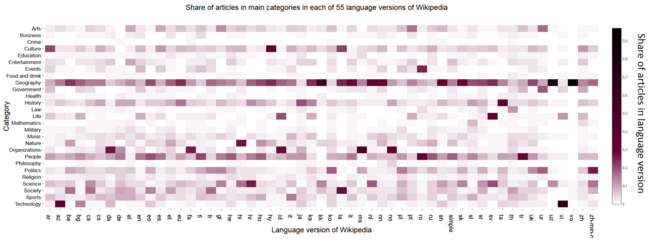
From a methodological standpoint, comprehensively labeling Wikipedia articles according to a relatively small number of topics is quite challenging. This problem has inspired many approaches and taxonomies (e.g.,
There are a lot of data and visualizations in this paper that I would encourage the reader to view for themselves. The authors also expose their results through the website WikiRank.
(See also earlier coverage of related publications by some of the same authors)

OpenSym 2019
- Report by Tilman Bayer
The fifteenth edition of the annual OpenSym conference took place in Skövde, Sweden last month. The event was launched in 2005 as "WikiSym", focusing exclusively on research about wikis, but over time came to include other forms of "open collaboration" and was renamed to OpenSym several years ago. Many papers presented at this year's OpenSym (see proceedings) studied open source software collaboration, but a substantial part were still focused on Wikipedia, Wikidata and other wikis. Apart from Balderas et al.'s paper on wikis and procrastination (reviewed above), these were:
First literature survey of Wikidata quality research
Among the takeaways presented from this overview of 28 papers which covered this area since Wikidata's launch in 2012 (some comparing it with other structured data projects such as DBpedia or YAGO):[4]
- Many papers have examined the completeness of Wikidata's data, but few its accuracy.
- The high availability (server uptime) of wikidata.org is a relevant quality aspect for many users.
- "Wikidata outperforms similar projects in many dimensions."
"Article Quality Classification on Wikipedia: Introducing Document Embeddings and Content Features"
From the abstract:[5]:
"... we extend [the] previous line of research on [automated] article quality classification by extending the set of features with novel content and edit features (e.g., document embeddings of articles). We propose a classification approach utilizing gradient boosted trees based on this novel, extended set of features extracted from Wikipedia articles. Based on an established dataset containing Wikipedia articles and quality classes, we show that our approach is able to substantially outperform previous approaches (also including recent deep learning methods [cf. previous coverage: 'Improved article quality prediction with deep learning'])."
"Document embeddings" refers to mapping each article to a vector in a vector space of "500 latent dimensions" (analogous to word embeddings), resulting in "a numeric, latent representation of the document content, its context, and semantics. We hypothesize that adding this comprehensive article representation can be leveraged for getting a better representation of the contents of an article and hence, its quality."
The edit-related features include the timestamps of the article's last 100 edits, and "the vector differences between the
(See also tweets from the presentation: [2], [3])
"When Humans and Machines Collaborate: Cross-lingual Label Editing in Wikidata"
This paper[6] examines the work on labels in Wikidata (i.e. the most common name of an item in a particular language, typically but not always coinciding with the title of the corresponding Wikipedia article in that language, if it exists).
From the conclusions:"We identify three types of editors: registered editors, bots, and anonymous editors. Bots contributed to the most number of labels for specific languages while registered users tend to contribute more to multilingual labels, i.e., translation. The hybrid approach of Wikidata, of humans and bots editing the knowledge graph alongside, supports the collaborative work towards the completion of the knowledge graph."
"Approving automation: analyzing requests for permissions of bots in Wikidata"
From the paper's conclusions:[7]
"We studied the formal process of requesting bot rights in Wikidata [...] The RfPs [ requests for permission ] were studied mainly from two perspectives: 1) What information is provided during the time the bot rights are requested and 2) how the community handles these requests. We found that the main tasks requested are adding claims, statements, terms and sitelinks into Wikidata, as well as the main source of bot edits have their roots in Wikipedia. This contrasts with Wikipedia where bots are performing mostly maintenance tasks. Our findings also show that most of the RfPs were approved and a small number of them were unsuccessful mainly because operators had withdrawn or there was no activity from the operators."
"Dwelling on Wikipedia: Investigating Time Spent by Global Encyclopedia Readers"
From the abstract and paper[8] (co-authored by this reviewer):

"In 2017, the Wikimedia Foundation began measuring the time readers spend on a given page view (dwell time), enabling a more detailed understanding of [Wikipedia] reading patterns. In this paper, we validate and model this new data source and, building on existing findings, use regression analysis to test hypotheses about how patterns in reading time vary between global contexts.
Consistent with prior findings from self-report data, our complementary analysis of behavioral data provides evidence that Global South readers are more likely to use Wikipedia to gain in-depth understanding of a topic. [...] The median reading time [across all Wikipedias, globally] is 25 seconds and the 75th percentile is 75.1 seconds. [...] Based on our data, we estimate that humanity spent about 672,349 years reading Wikipedia from November 2017 through October 2018."
(See also: slides and tweet from the presentation, project page on Meta-wiki, planned public data release, Wikimania presentation/tweet)
"Visualization of the Evolution of Collaboration and Communication Networks in Wikis"
This paper[9] presented applications of the "WikiChron" tool, available as a demo for various (non-Wikimedia) wikis at http://wikichron.science/ (with source code available on GitHub). It was also the subject of a presentation at this year's Wikimania.
This paper
Among the potential barriers to volunteer participation on WikiTribune identified by the researchers - in particular in its initial version - were the website's design (emphasizing readability over editability), and a real names policy. Over time, the project's model morphed from closed to hybrid to more open (also involving the departure of all paid journalists). Some data from the project's first year, as highlighted in the presentation: The vast majority of articles (79%) were written by the paid staff. Articles tended to be UK-centric, have a low engagement in the comments, and had on average nine revisions and six different contributors.
Conferences and events
See the page of the monthly Wikimedia Research Showcase for videos and slides of past presentations.
Other recent publications
Other recent publications that could not be covered in time for this issue include the items listed below. Contributions, whether reviewing or summarizing newly published research, are always welcome.
- Compiled by Tilman Bayer
- Papers from ICWSM 2019
"Eliciting New Wikipedia Users' Interests via Automatically Mined Questionnaires: For a Warm Welcome, Not a Cold Start"
From the abstract[11] of this paper (which received the "Outstanding Problem-Solution Paper" award at the conference):
"Standard recommender systems [...] rely on users' histories of previous interactions with the platform. As such, these systems cannot make high-quality recommendations to newcomers without any previous interactions -- the so-called cold-start problem. The present paper addresses the cold-start problem on Wikipedia by developing a method for automatically building short questionnaires that, when completed by a newly registered Wikipedia user, can be used for a variety of purposes, including article recommendations that can help new editors get started. Our questionnaires are constructed based on the text of Wikipedia articles as well as the history of contributions by the already onboarded Wikipedia editors. We assess the quality of our questionnaire-based recommendations in an offline evaluation using historical data, as well as an online evaluation with hundreds of real Wikipedia newcomers, concluding that our method provides cohesive, human-readable questions that perform well against several baselines."
See also project page on Meta-wiki
Shocks make both newcomers and experienced editors contribute more
From the abstract:[12]
"[We study] participation following shocks that draw attention to an article. Such events can be recruiting opportunities due to increased attention; but can also pose a threat to the quality and control of the article and drive away newcomers. [We examine] shocks generated by drastic increases in attention as indicated by data from Google trends. We find that participation following such events is indeed different from participation during normal times–both newcomers and incumbents participate at higher rates during shocks. We also identify collaboration dynamics that mediate the effects of shocks on continued participation after the shock. The impact of shocks on participation is mediated by the amount of negative feedback given to newcomers in the form of reverted edits and the amount of coordination editors engage in through edits of the article’s talk page."
"Crosslingual Document Embedding As Reduced-Rank Ridge Regression"
From the abstract: [13]
"... For training, our approach leverages a multilingual corpus where the same concept is covered in multiple languages (but not necessarily via exact translations), such as Wikipedia."
Tweet by one of the authors:
"Try Cr5, our new model for crosslingual document embedding! Input: text in any of 28 languages Output: language-independent vector representation, so you can compare text across langs. Pre-trained model and API: https://github.com/epfl-dlab/Cr5 "
- Other publications
"Framing the Holocaust Online: Memory of the Babi Yar Massacres on Wikipedia"
From the abstract[14]
"The article explores how a notorious case of Second World War atrocities in Ukraine – the Babi Yar massacres of 1941-1943 – is represented and interpreted on Wikipedia. Using qualitative content analysis, it examines what frames and content features are used in different language versions of Wikipedia to transcribe the traumatic narrative of Babi Yar as an online encyclopedia entry. It also investigates how these frames are constructed by scrutinizing the process of collaborative frame-building on discussion pages of Wikipedia and exploring how Wikipedia users employ different power play strategies to promote their vision of the events at Babi Yar."
(See also "Framing the Holocaust in popular knowledge" below, and related earlier coverage: "Holocaust articles compared across languages")
"Framing the Holocaust in popular knowledge: 3 articles about the Holocaust in English, Hebrew and Polish Wikipedia"
From the abstract[15]:
" ... the article conducts a content analysis of three articles, in three different languages [...]: “
Auschwitz-Birkenau Camp”, “The Pogrom in Jedwabne”, and “Righteous Among the Nations”. [...] Analyzing how the articles fulfill each of the roles in the different languages, the research hypothesis is that the framing of the phenomena will differ between the versions, and each version will follow pillars of the collective memory of the Holocaust in its respective country. Findings, however, are not in complete compliance with this hypothesis."
(See also "Framing the Holocaust Online" above, and related earlier coverage: "Holocaust articles compared across languages")
References
- ISBN 9781450363198.
- ^ Rothschild, Annabel; Lurie, Emma; Mustafaraj, Eni (2019). "How the Interplay of Google and Wikipedia Affects Perceptions of Online News Sources" (PDF). Computation + Journalism Symposium. Retrieved 29 September 2019.
- .
- ISBN 9781450363198.
- ISBN 9781450363198.
- ISBN 9781450363198.
- ISBN 9781450363198.
- ISBN 9781450363198.
- ISBN 9781450363198.
- ISBN 9781450363198.
- arXiv:1904.03889 [cs.IR].
- S2CID 96439496.
- ^ Makhortykh, Mykola (2017). "Framing the Holocaust Online: Memory of the Babi Yar Massacres on Wikipedia". Digital Icons: Studies in Russian, Eurasian and Central European New Media (18): 67–94.
- ^
Wolniewicz-Slomka, Daniel (2016-12-22). "Framing the Holocaust in popular knowledge: 3 articles about the Holocaust in English, Hebrew and Polish Wikipedia". Adeptus (8): 29–49. ISSN 2300-0783.
- Supplementary references and notes:
- ^ Fishkin, Rand (13 August 2019). "Less than Half of Google Searches Now Result in a Click". SparkToro. Retrieved 29 September 2019.
- ^ Matsakis, Louise (16 March 2018). "Youtube, Facebook, and Google Can't Expect Wikipedia to Cure the Internet". Wired. Retrieved 29 September 2019.
Finding freely licensed photo collections
Wikipedia has the special position to be able to use and present any public domain or freely licensed media collections which any archive shares. This gallery showcases media newly available in September 2019 which either our own Wikimedia contributors have submitted in media campaigns, or which a publisher has recently profiled as a collection for free and open reuse, or which Wikimedia community members have found and archived in Wikimedia Commons.
Enjoy the collections and please use media from these collections to enrich Wikipedia's content.
SELF Magazine and the AAP Promote Vaccine Awareness Through CC-Licensed Images
Self magazine shares a media collection depicting people getting their vaccines.
- Steuer, Eric (26 August 2019). "SELF Magazine and the AAP Promote Vaccine Awareness Through CC-Licensed Images". Creative Commons.
- Commons::Category:SELF x American Academy of Pediatrics Vaccine Photo Project
- SELF Magazine and the AAP Promote Vaccine Awareness Through CC-Licensed Images, discussion at WikiProject Medicine
Discuss this collection at Wikipedia:WikiProject Medicine.
Roadside attractions
-
Kingman, Arizona
-
Ogden, Utah
-
Houston, Texas
-
Atlantic City, New Jersey
The Public Domain Review profiles the Library of Congress archives of John Margolies' United States roadside attraction photography.
- "John Margolies' Photographs of Roadside America". The Public Domain Review. 29 August 2019.
- Commons:Category:John Margolies Roadside America Photograph Archive
- "John Margolies Roadside America Photograph Archive, Rights and Restrictions Information". www.loc.gov. Library of Congress. 28 April 2017.
- gallery, all public domain
Discuss this collection at Wikipedia:WikiProject United States.
Cybersecurity challenge
Design company
The first round of the challenge ended in early September 2019, the refinement phase ends later September, and winner selection begins soon after. Any of the images might illustrate relevant Wikipedia articles.
Discuss this collection at Wikipedia:WikiProject Internet culture
Servier Medical Art
- Commons:Commons:SMART-Servier Medical Art
- https://www.flickr.com/photos/serviermedicalart/
- Apparently created in 2013, but only recently migrated into Commons
Thanks to Netha Hussain and OlafJanssen for finding this collection.
Discuss this collection at Wikipedia:WikiProject Medicine.
Wiki Loves Pride 2019
-
Kraków
-
Belgrade
-
San Francisco
-
Vilnius
- Wiki Loves Pride 2019 finished in August - has results
- Wikipedia:Wiki Loves Pride/2019
- Commons:Category:Wiki Loves Pride 2019
- Commons:Category:2019 LGBT events
Discuss this collection at
Wiki Loves Monuments 2019
-
Bangladesh
-
Iran
-
Ghana
-
Nepal
The 2019 edition of Wiki Loves Monuments is wrapping up. These photos are just some of The Signpost's favorites. Official contest winners for most countries will be announced next month.
Find the WikiProject for the category you like, then discuss images in that collection there.
What's making you happy this month?
There are many opportunities to discuss bad news, problems, and concerns in the Wikiverse, and I think that having candid discussions about these issues is often important. Many days I spend more time thinking about problems than about what is going well. However, also I think that acknowledging the good side and taking a moment to be appreciative can be valuable.
I encourage you to add your comments about what's making you happy this month to the talk page of this Signpost piece.
Week of 1 September 2019: Τι σας κάνει ευτυχείς αυτήν την εβδομάδα?
Wikidata and medical data

Visual content
-
Butterfly takeoff in slow motion, uploaded by Japanese Wikipedia contributor User:Phonon.b
-
"Columns in Turkish baths, Salamis, Northern Cyprus", by User:Podzemnik, who is a native speaker of Czech and identifies as "Librarian, photographer, nomad, hiker".
-
"Window in Fira, Santorini, Greece", by German Wikipedia contributor User:XRay
Text content
-
Martin Luther King, Jr.
-
William Least Heat-Moon
-
C. J. Cherryh
- Selected anniversaries for English Wikipedia noted that 28 August was the anniversary of the "I Have a Dream" speech by American civil rights activist and religious minister the Rev. Martin Luther King, Jr.
- English Wikiquote of the Day for 28 August: "At any particular moment in a man's life, he can say that everything he has done and not done, that has been done and not been done to him, has brought him to that moment. If he's being installed as Chieftain or receiving a Nobel Prize, that's a fulfilling notion. But if he's in a sleeping bag at ten thousand feet in a snowstorm, parked in the middle of a highway and waiting to freeze to death, the idea can make him feel calamitously stupid." —William Least Heat-Moon
- English Wikiquote of the day for 1 September: "People ask where writers get ideas. Take my advice. Some cool, clear night, drive to a country place where city lights don’t block your view. Turn off the car lights. Get out and look up. And see our real neighborhood." —C. J. Cherryh
About these individuals, according to English Wikipedia: "Martin Luther King Jr. (January 15, 1929 – April 4, 1968) was an American Baptist minister and activist who became the most visible spokesperson and leader in the civil rights movement from 1955 until his assassination in 1968. Born in Atlanta, King is best known for advancing civil rights through nonviolence and civil disobedience, tactics his Christian beliefs and the nonviolent activism of Mahatma Gandhi helped inspire. King led the 1955 Montgomery bus boycott… He led an unsuccessful 1962 struggle against segregation in Albany, Georgia, and helped organize the nonviolent 1963 protests in Birmingham, Alabama. He helped organize the 1963 March on Washington, where he delivered his famous "I Have a Dream" speech."
William Least Heat-Moon "is an American travel writer and historian of English, Irish, and Osage ancestry". He earned a Ph.D. in English from the University of Missouri and worked as a professor of English. He wrote an autobiographical travel book, Blue Highways, that was well received. According to the article about Blue Highways, "Stories that arose from Least Heat-Moon's research as well as historical facts are included about each area visited, as well as conversations with characters such as a Seventh-day Adventist evangelist hitchhiker, a teenage runaway, a boat builder, a monk, an Appalachian log cabin restorer, a rural Nevada prostitute, fishermen, a Hopi Native American medical student, owners of Western saloons and remote country stores, a maple syrup farmer, and Chesapeake Bay island dwellers."
"Carolyn Janice Cherry (born September 1, 1942), better known by the pen name C. J. Cherryh, is an American writer of speculative fiction. She has written more than 80 books since the mid-1970s, including the Hugo Award-winning novels Downbelow Station (1981) and Cyteen (1988), both set in her Alliance-Union universe. She is known for "world building", depicting fictional realms with great realism supported by vast research in history, language, psychology, and archaeology. Her series of fantasy novels set in the Alliance-Union universe, the Morgaine Stories, have sold in excess of 3 million copies."
Wikidata discussions

Regarding the concept known as federation (more information in this month's In focus report – ed.)
- https://lists.wikimedia.org/pipermail/wikidata/2019-September/013405.html
- https://lists.wikimedia.org/pipermail/wikidata/2019-September/013406.html
Regarding multilingualism on Wikidata
MediaWiki "Timeless" skin

- The final report for the grant for the Timeless skin was published by User:Isarra
Off wiki
-
The chemical structure of morphine
-
Thomas Jefferson University Hospital in Philadelphia
A request for contributions to this publication
I enjoy writing WMYHTW, and I am grateful for the feedback that I occasionally receive. However, there are a few things that are lacking. One is participation from others. I am trying to avoid WMYHTW threads effectively being "What's making Pine happy this week?" instead of "What's making you happy this week?". I cannot know everything good that happens in the Wikiverse, and I would love to see greater diversity of stories in WMYHTW. Also, writing WMYHTW in this level of detail is surprisingly time consuming for one person, which is another reason that I would be appreciative if other people would add small pieces of good news to the content of WMYHTW. Regrettably, I cannot continue to have this publication require so much time from me that writing this is effectively a part time unpaid job, including adapting the content of these emails for The Signpost. Your participation would be very much appreciated.
Week of 8 September 2019: Qu’est-ce qui vous rend heureux cette semaine?
The Teahouse

Featured images
-
French Wikipedia picture of the day for 1 September: a Menger sponge illuminated with ray tracing
-
English Wikipedia picture of the day for 2 September: Pied kingfisher (Ceryle rudis leucomelanurus) female. The photo was taken at the Chambal River in India.
-
Commons picture of the day for 3 September: an escalator in Umeda Sky Building, Osaka Prefecture, Japan.
-
English Wikipedia picture of the day for 4 September: "Wells Cathedral's nave, viewed from the entrance, in Somerset, England."
-
English Wikipedia picture of the day for 5 September: "Mammillaria spinosissima, also known as the spiny pincushion cactus, is a species of flowering plant in the cactus family Cactaceae, endemic to the central Mexican states of Guerrero and Morelos."
-
English Wikipedia picture of the day for 6 September: social worker, civic activist, and Nobel Prize winner Jane Addams
-
French Wikipedia picture of the day for 7 September: "Dry Creek Valley..."
-
French Wikipedia picture of the day for 8 September: self-portrait of the Dutch artist Vincent van Gogh
Breaking news coverage of weather incidents
-
Geostationary imagery of Hurricane Dorian (05L) taken by the GOES 15 satellite
-
Track map of Hurricane Dorian of the 2019 Atlantic hurricane season
-
NOAA 5-day track and intensity forecast cone for Hurricane Dorian. See the file history.
-
South Carolina National Guard briefing
-
Puerto Rico National Guard preparations
-
Florida National Guard preparations
-
Helicopter preparations
-
U.S. Coast Guard Cutters Angela McShan and Moray
English Wikipedia seems to have some highly active weather enthusiasts who cover topics such as Hurricane Dorian, along with many people who are willing to write about breaking news stories. Although weather emergencies are bad news, English Wikipedia's timely and detailed coverage of them is good to see.
Operation Enduring Encyclopedia
-
A community election of stewards
-
A checkuser examines evidence in a sockpuppet investigations case
-
An oversighter with a collection of prohibited content
-
Recent changes patrol and New pages patrol
-
Edit filter managers
-
English Wikipedia Arbitration Committeehearing room
-
Anarbitration enforcement
-
Wikimedia Foundation servers
-
An information systems technician monitors network activity
- Password requirements were strengthened for Wikimedia user accounts to deter users from having any of the 100,000 most common passwords. See Phabricator:T151425.
- distributed denial of service attack on 6 September 2019. See Phabricator:T232224 and this email.
- Preparations are underway for English Wikipedia Arbitration Committee elections in December 2019.
English Wikiquote of the day
-
A fireboard that was decorated by Moses in the year 1918
-
Grandma Moses postage stamp from the year 1969
"I'll get an inspiration and start painting; then I'll forget everything, everything except how things used to be and how to paint it so people will know how we used to live."
— Americanfolk artist Grandma Moses
Off wiki
-
Nyota Uhura
-
Video of a humpback whale singing
Closing comments To reduce the time that I spend adapting WMYHTW for both Wikimedia-l and The Signpost, and to reduce errors in these emails, this week I first drafted this issue of WMYHTW on wiki. Adapting the content from wiki format to email format seems to be somewhat faster than adapting from email format to wiki format. However, after this week, I will likely be spending much less time on WMYHTW for the foreseeable future. I have bills that need to be paid.
Week of 15 September 2019: O que está te fazendo feliz esta semana?
English Wikiquote of the day for 15 September
"To be part of something one doesn't in the least understand is, I think, one of the most intriguing things about life. I like living. I have sometimes been wildly despairing, acutely miserable, racked with sorrow, but through it all I still know quite certainly that just to be alive is a grand thing."
— Agatha Christie, of England, author of popular and award-winning works of detective fiction
Images



- Maps and photos of Brazil
-
Topographic map, by German Wikipedia contributor User:Captain Blood based on various mapping tools
-
Map of Köppen climate types, by User:Redtitan
-
The Palácio do Planalto, the official workplace of Brazil's president, by User:Gastão guedes
-
Oil platform P-51, by Brazilian public news agency Agência Brasil
-
Municipal Theater of São Paulo, byUser:The Photographer (also known as User:Wilfredor)
-
Jaguar at the Piquiri River, the Pantanal, Brazil, by User:Charlesjsharp
-
Iguazú Falls, by User:Enaldo Valadares
-
Abismo Anhumas (Anhumas Abyss), by User:Caioribeirovilela
-
Aerial view of theAmazon rain forest, by Neil Palmer of the International Center for Tropical Agriculture
Week of 22 September 2019: Ի՞նչն է Ձեզ երջանկացնում այս շաբաթ:
Pictures from Armenia

Other recent pictures of the day on English Wikipedia and Wikimedia Commons
-
Schönbühel Castle (Schloss Schönbühel) in Schönbühel-Aggsbach, Lower Austria, in a photo by User:Uoaei1
-
Google Art Project, and it was uploaded to Wikimedia Commons by User:Crisco 1492.
-
Elizabeth L. Remba Gardner, a member of the United StatesWomen's Airforce Service Pilots (WASPs), in a photo that was probably taken during World War II. The image was uploaded by User:Junkyardsparkle, and edited by User:Hohum and User:Bammesk.
-
stacked with CombineZP. The image was created by User:LivingShadow.
-
Fog in a valley in .
Plans being considered for code review office hours
WMF is considering reviving office hours for code review or events that would serve a similar purpose. See https://lists.wikimedia.org/pipermail/wikitech-l/2019-September/092565.html.

Discovery of interstellar comet 2I/Borisov
This comet is the second
- Known interstellar objects
-
Animation of interstellar objectsgif animation that was created by User:Tony873004.
-
ʻOumuamua is the small white dot
Wiktionary humor
The Wiktionary Word of the Day for International Talk Like a Pirate Day 2019 was "yo-ho-ho".
Wikiquotes
History is full of stories, full of triumph and tragedy and battles won and lost. It is the people who speak to me, the men and women who once lived and loved and dreamed and grieved, just as we do. Though some may have had crowns on their heads or blood on their hands, in the end they were not so different from you and me, and therein lies their fascination. I suppose I am still a believer in the now unfashionable "heroic" school, which says that history is shaped by individual men and women and the choices that they make, by deeds glorious and terrible.
— Writer George R. R. Martin, author of the A Song of Ice and Fire series of fantasy novels that was the basis for the television series Game of Thrones
Yes; as the music changes,
Like a prismatic glass,
It takes the light and ranges
Through all the moods that pass;
Dissects the common carnival
Of passions and regrets,
And gives the world a glimpse of all
The colours it forgets.
— Writer Alfred Noyes of England in his poem "The Barrel-Organ"
Week of 28 September 2019: Vad glädjer dig den här veckan?
A Wikilibrarian's story
- Oregon State University
-
Presentation about Wikipedia and the Wiki Education Foundation at The Valley Library in 2015
-
College basketball:University of Oregon Ducks
One's advent into the world of Wikimedia projects is almost always a noteworthy account. Here we share one such account of a librarian who was introduced to Wikipedia in an unusual way and began their adventure trying to better understand Wikipedia and now helps others understand it too!
Laurie Bridges is an Instruction and Outreach Librarian at Oregon State University in the US. She was introduced to Wikipedia by her son: at age 9, he was assigned a class project to research and present about a species of frog, and was told to only use Wikipedia for his research. When he related this to her, she thought, "If 9-year-olds are being introduced to research using Wikipedia, I better learn more about Wikipedia". So she got involved because she wanted to better understand the resource her son, and the students at her university, use. She explains:
Students and faculty are familiar with [Wikipedia] because many use it daily, although they do not cite it in their papers. As a librarian I teach about information literacy and help students and faculty with their research. Wikipedia is a familiar website that I can use to teach information literacy and afterwards students and faculty leave equipped with a better understanding of how the information source works. Students are used to teachers and professors saying, "Don't use Wikipedia." However, this dismissive statement doesn't teach the students how, why, or when they can use Wikipedia or other online resources. We are living in a time of misinformation and I want students to understand the information they are using and become critical consumers of that information. Using Wikipedia to teach students about information literacy is fun! In addition, it's fulfilling because I can see students' excitement as they learn more about Wikipedia, a website they use on a daily basis. I've found teaching with Wikipedia to be so rewarding that I want to spread the word.
Finally, if librarians don't teach students about Wikipedia and what it is (or isn't), who is going to teach them? I'd like to see more activity and interest from librarians related to Wikipedia. This is why whenever I get a chance, I will introduce other librarians to … the Wikimedia Movement. Last year I received a scholarship to attend Wikimedia + Education in San Sebastián, Spain. I was only one of two librarians in attendance (in addition to Basque librarians who were volunteering at the event). It was a great learning opportunity and I connected with so many enthusiastic educators. I'd love to see enough interest from librarians to host a Wikimedia + Libraries conference! That would be a great conference!
The change of seasons
There are a variety of ways to define
Awhile back I learned of a Scandinavian practice called kulning, which involves using songs to call herds of cattle over long distances. Here is a video (Youtube link) that shows cattle being summoned out of the field with a kulning call for the last time of the year in September 2017.
Here are a few music selections for the transition from summer to fall:
- "Summer End | Chill & Jazzhop", by Fantastic Music (Youtube link)
- "Summer's Gone", by Bob Bradley & Thomas Balmforth (Youtube link)
And for the transition from winter to spring:
(The performances linked below feature John Harrison on the violin, and the Wichita State University Chamber Players. The conductor was Robert Turizziani. The performance rights release was received by Wikimedia Commons via OTRS.)
- Concerto No. 1 in E major, Op. 8, RV 269, "La primavera" (Spring) — Movement 1: Allegro from The Four Seasons, composed by Antonio Vivaldi
- Concerto No. 1 in E major, Op. 8, RV 269, "La primavera" (Spring) — Movement 2: Largo from The Four Seasons, composed by Antonio Vivaldi
- Concerto No. 1 in E major, Op. 8, RV 269, "La primavera" (Spring) — Movement 3: Allegro from The Four Seasons, composed by Antonio Vivaldi
-
Title page from Vivaldi's Cimento dell' Armonia e dell' Inventione, volume 2, 2nd violin part (1725)
-
Autumn in France
-
Spring in South Africa
Regarding translations
Skillful translations of the sentence "What's making you happy this week?" would be very much appreciated. If you see any inaccuracies in the translations in this article then please {{ping}} User:Pine in the discussion section of this page, or boldly make the correction to the text of the article. Thank you to everyone who has helped with translations so far.
Your turn
What's making you happy this month? You are welcome to write a comment on the talk page of this Signpost piece.
Wikidata & Wikibase for national libraries: the inaugural meeting
- At the 2019 Wikimania conference, Europeana – a Europe-wide digital cultural platform – held several associated events, including the inaugural meeting of national libraries which work directly with Wikidata and its underlying software Wikibase. The event was organized by Liam Wyatt in his professional role as Europeana's Wikipedia liaison. This article was also written in that role and originally published at the Europeana blog.
- In his other role as a Wikipedia volunteer he is usually called Wittylama. He is one of the founders of Wikimania 2019 –S
At the forefront of innovation
As Wikidata becomes an increasingly large, densely connected, web of linked data, the cultural heritage sector is leveraging the platform more and more. None more so than national libraries, who have been at the forefront of innovations. Thirty institutional representatives participated in this meeting from three continents.
The meeting began with a series of short demonstration talks from institutions already working with Wikidata and Wikibase in-house. These are notable not only for the variety of activities undertaken and the successes already being reported from these young projects, but also for the fact that until recently, they have all been happening largely in isolation with limited knowledge-sharing.
Demonstrations of projects currently underway were given by:
- Llyfrgell Genedlaethol Cymru/National Library of Wales (slides)
- Kansalliskirjasto/National Library of Finland (slides)
- Bibliothèque Nationale de France/National Library of France (slides)
- Deutsche Nationalbibliothek/National Library of Germany (slides)
- Library of Congress – United States (slides)
- Linked Data for Production project (LD4P) – United States (slides)
- OCLC – International (slides)
- Kungliga biblioteket/National LIbrary of Sweden (slides)
The new director of the National Library of Sweden, Karin Grönvall, on quite literally her first day at the job, also took the time to greet us.
Heading into the meeting, approximately 40% of the attendees reported that their institution had already undertaken export of their own information into Wikidata. Afterwards, more than 50% reported that as a specific result of what they had learned they would now investigate undertaking further exports; over 60% also reported they would now be investigating the Wikibase software for in-house use, and 100% of responses received stated a high satisfaction with the day's usefulness for their institution.
| “ | I found it incredibly helpful to learn more about the Wikidata projects that other institutions are working on, areas in which we could potentially collaborate, and to get a better idea of the future directions of Wikidata and Wikibase to inform our project plans. | ” |
| — participant survey feedback | ||
What's next: the roadmap
Following the initial presentations, the meeting moved on to discussions informing – and also getting valuable feedback about – the 'roadmap': the forthcoming developments in Wikidata and Wikibase.
This began with a section on the work of the Structured Data on Commons project – which is bringing the power of linked data to Wikimedia Commons – and was followed by in-depth discussions of two specific areas of Wikibase software development that are common requests for libraries: permissions and federation.
The former request, permissions, refers to the nuanced read and/or write permissions that cultural institutions would like to provide when managing their own catalogue infrastructure on Wikibase. While in Wikidata the general principle is that everyone can see and edit any part of any item, for libraries this might not be sufficient. Potential outcomes include: designating certain users with advanced permissions to edit specific sections of items, or certain items in entirety; and making certain items or sections of those items visible only to particular users. Having a 'second opinion' check-function before a change is published was also discussed. These features might be necessary, for example, in catalogue management where some library staff have the right to edit bibliographic metadata, while other designated staff might have the right to view particularly sensitive information about acquisitions.
The latter request, federation, refers to the principle that multiple Wikibase instances can work with each other – each containing different information, but being able to sync elements so as not to duplicate effort and in order to propagate up-to-date information. However, as Lydia Pintscher – Wikidata product manager – explained to the group, everyone believes federation is a good idea, however everyone also has a different understanding of what it would mean in practice! In the meeting we talked through various practical options of federated Wikibase including but not limited to: shared properties but local items, shared items but local properties, and shared querying.
Strategic papers of interest
Almost simultaneously to this event, the Wikidata team published four strategy papers, including the high-level vision, and a specific paper discussing the future of the Wikibase ecosystem. This latter report provides the specific motivation for why the cultural sector – particularly national libraries – are investigating Wikibase:
| “ | Wikibase is useful for any kind of heterogeneous data, where connections between the data play an important role. This is relevant for all kinds of fields, starting from (digital) humanities to life sciences. Recently we have seen a lot of activity from the GLAM sector. […] Seven national libraries, among them Germany and France, have run substantial pilots, and libraries from seven more countries have communicated interest in evaluating or using Wikibase or Wikidata as a platform for creating or participating in linked data work for the sector. [...] So far, we have mainly been asking institutions to donate content to us. By fostering a Wikibase Ecosystem, we also have something significant and useful to give back to institutions. This kind of mutually beneficial relationship would strengthen our existing bonds with institutions, and create new partnerships with institutions we haven't reached yet. | ” |
| — Lydia Pintscher, Lea Voget, Melanie Koeppen, Elena Aleynikova and contributors, Strategy for the Wikibase Ecosystem, pages 3, 8 | ||
This strategy is consistent with the extensively researched Association of Research Libraries April 2019 whitepaper discussing the use of Wikibase and Wikidata in the library context.
For more information about any of the discussions during the Stockholm meeting, please consult the comprehensive notes taken during the day itself.




















































































